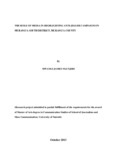| dc.contributor.author | Mwangi, James Ngunjiri | |
| dc.date.accessioned | 2013-11-13T09:47:04Z | |
| dc.date.available | 2013-11-13T09:47:04Z | |
| dc.date.issued | 2013-10 | |
| dc.identifier.citation | Master of Arts degree in Communication Studies | en |
| dc.identifier.uri | http://erepository.uonbi.ac.ke:8080/xmlui/handle/123456789/58869 | |
| dc.description | (Research project submitted in partial fulfillment of the requirements for the award of Master of Arts degree in Communication Studies of School of Journalism and Mass Communication; University of Nairobi | en |
| dc.description.abstract | This study, conducted in Murang‟a South district, Murang‟a County was conceived out of an observation of jiggers infestation problem among the residents. The anti-jigger campaign started after a non-governmental organization known as Ahadi Kenya Trust encountered some families with severe jiggers‟ infestation in Murang‟a. In an effort to help them, they found out that the problem was bigger than they thought, as there were children who were missing out on school due to the menace. The study intended to establish ways of creating awareness about the role of media in highlighting anti-jigger campaigns which would contribute to the improvement of living standards of the infested and affected people in Murang‟a South district, Murang‟a County. The study covered an entire population of people between the ages of 10 to 50 years. The cluster/ Multi-stage sampling method was used to represent a total population of 385,450. After visiting schools and homes in the vicinity of the study, it was evident that 75 per cent of Murang‟a South district residents considered jiggers as a serious problem which had affected the region. They felt that it was a good idea for various stakeholders in the health sector to have come up with anti-jigger campaigns covering the region. The study established that the media should go out of their normal way of coverage and do coverage that will support continuity of the anti-jigger campaigns all over the country. The media should give prominence to infested households, activities of community health extension workers (CHEWs) and community health workers (CHWs). It should also support the Ministry of Public Health and Sanitation in passing the health messages, through coverage of health conferences, interviews with health officials/victims involved and this should be encouraged and appreciated/adopted easily the new mode of living when they see in the media what is happening within their own set-up. | en |
| dc.language.iso | en | en |
| dc.publisher | University of Nairobi | en |
| dc.title | The role of media in highlighting anti-jigger campaigns in Murang’a South District, Murang’a County | en |
| dc.type | Thesis | en |
| local.publisher | School of Journalism and Mass Communication | en |

